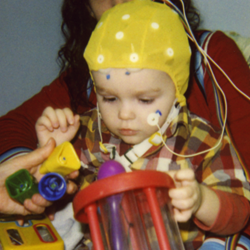A new I-LABS research discovery, published in PLOS ONE, shows that the pattern of brain responses to words (measured using Event Related Potentials) in 2-year-old children with autism spectrum disorder predicts those children’s skills when they reach 4 and 6 years of age.
 The brain measure of word processing not only predicted outcomes on standardized tests of the children’s language abilities, but also their abilities on standardized tests of cognitive skills and adaptive skills. The predictive value of the brain measure improved over time, and was equally accurate regardless of the kind of treatment the children with autism received in the intervening 4 years. The results demonstrate the sensitivity and predictive power of early brain measures on later skills.
The brain measure of word processing not only predicted outcomes on standardized tests of the children’s language abilities, but also their abilities on standardized tests of cognitive skills and adaptive skills. The predictive value of the brain measure improved over time, and was equally accurate regardless of the kind of treatment the children with autism received in the intervening 4 years. The results demonstrate the sensitivity and predictive power of early brain measures on later skills.
The work has implications both for future work on biomarkers leading to early diagnosis and for new interventions that can be applied early in development when the brain is at its highest level of plasticity. The result also adds support to the I-LABS view that early learning depends on a ‘social gating’ process. Social impairments in children with autism impede their interest in and ability to pick up on social cues.
Read the UW press release and the PLOS ONE article. Follow media coverage of this discovery in Science magazine, The Los Angeles Times, and TIME.
Lead author Patricia Kuhl discussed this finding on NPR’s Seattle affiliate KUOW and you can listen here. She will also be interviewed on NPR’s Science Friday, broadcast nationally on June 14.
More Media Coverage
ScienceDaily
Ivanhoe.com
The Scientist.com
West Info - Europe
The News - Pakistan
Examiner.com
MedicineNet.com
Zenopa.com